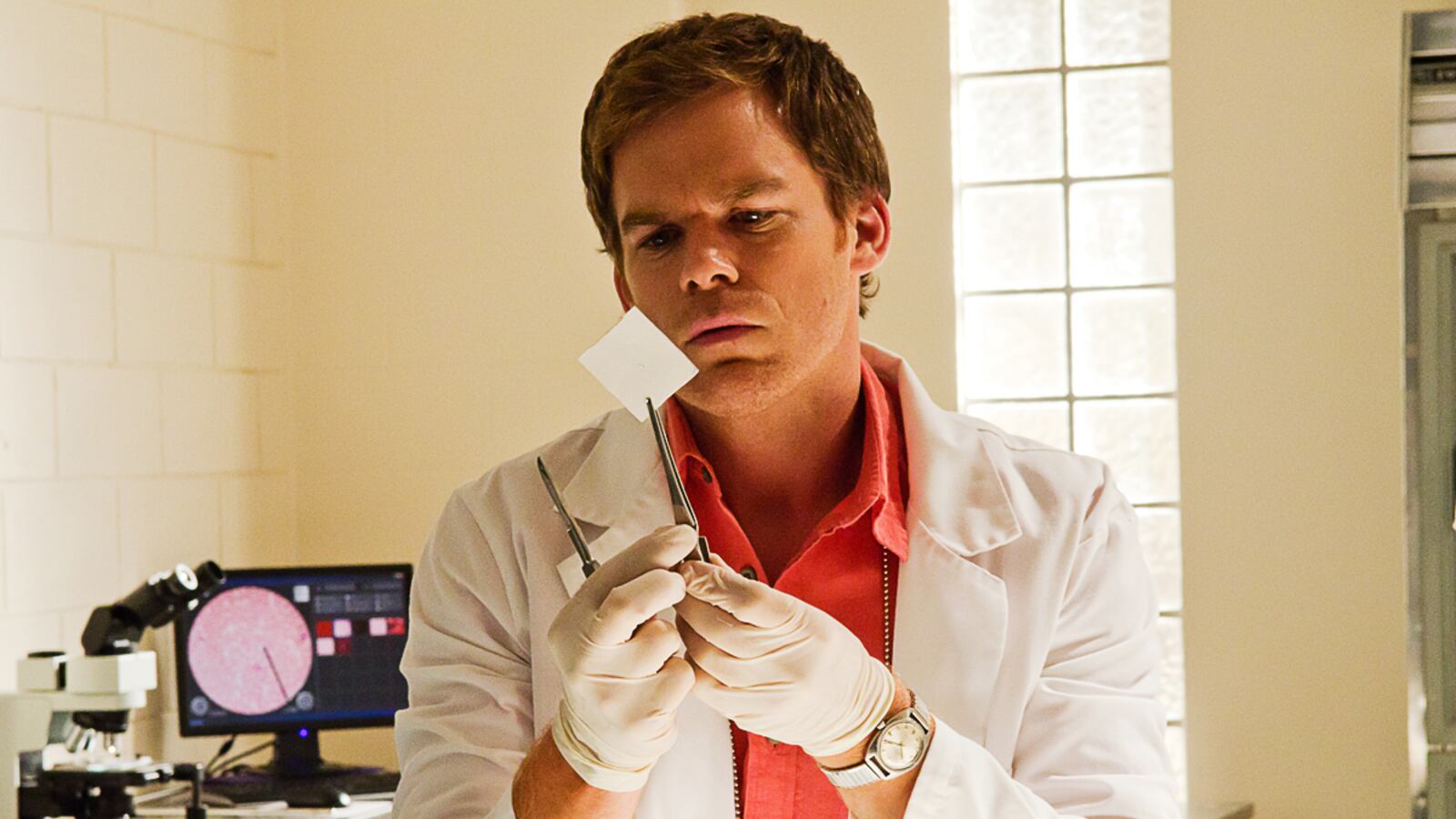During the course of six seasons, Dexter viewers have seen TV’s most beloved serial killer struggle with self-acceptance, intimacy, and redemption. As the sixth season nears its finish, Dexter (Michael C. Hall) has been wrestling with faith as he raises his little boy as a single father and wonders if there is something in the universe even bigger than his Dark Passenger—his nickname for the internal evil force that pushes him toward pursuing and murdering society’s worst citizens.
But some viewers and critics have been griping about the unevenness of the season and are wondering if there’s much more to believe in when it comes to the life of Showtime’s biggest hit, even though Dexter is seeing its highest ratings to date. The network recently renewed the four-time Emmy-nominated series for two more seasons, a guarantee that we will spend 24 more hours with the forensic-blood-spatter-analyst-turned-vigilante after this season wraps up on Dec. 18.
Much of the criticism of the season has centered on the main storyline, involving a pair of characters played by Edward James Olmos and Colin Hanks, dubbed by the police as the Doomsday Killers for the methodical Bible-inspired murders they commit as they anticipate the Rapture. In the Nov. 27 episode, it was revealed that Professor Gellar (Olmos) has been dead all along, murdered and hallucinated by Travis (Hanks). The twist was designed to come as a surprise, but many viewers were disappointed that they were able to put it all together early on in the season. The complaint is understandable, considering Dexter set the bar high at the end of the fourth season when it pulled off the horrific and shocking murder of Dexter’s wife, Rita (Julie Benz), at the hands of Dexter’s nemesis. Entertainment Weekly and bloggers are now wondering if Dexter's best days are behind it.
“I understand that Season 4 was a fantastic, fantastic season,” executive producer Sara Colleton told The Daily Beast. “And everyone’s welcome to their own opinion, but to me, the character [of Dexter] continues to grow and explore new terrain every season. Because so many people had been theorizing, I was shocked at the number of my friends who emailed me saying, ‘Oh, my God!’ and were surprised last week. It’s what you hope for, but it’s very hard to do.”

While the show has not been able to replicate the excitement of its fourth season, or even some of the tenderness of the fifth as Dexter fell for a wounded, complicated woman as he mourned his wife, it has not fallen apart despite turnover in the executive-producing ranks. Show runner Clyde Phillips and co-executive producer Melissa Rosenberg left after the fourth season, and Phillips’s replacement, Chip Johannessen, was fired after the fifth. But all the writers have worked on the show since the first season, including new show runner Scott Buck. In February, they will begin as a group to map out the last two seasons of the series, Colleton said.
From the beginning, Dexter’s journey has been designed thematically, according to where he is in his life. This season, the producers and writers decided it was time for him to explore faith—and his lack thereof—as he raised his baby boy, Harrison, by himself and wondered what code he should teach him. His father, Harry (James Remar), recognized Dexter’s Dark Passenger and trained him to use it to kill other killers. But Dexter hopes to steer Harrison toward the light.
“We all want to be a different father or mother to our child than our parents were,” Colleton said. “Dexter knows what Harry gave to him, and he loves Harry and will always be grateful, because by giving him the code, he gave him life. But there’s always a part of Dexter that wonders, ‘What if he had given me a chance?’ His legacy to Dexter is you have no choice—there are people that deserve to die. And Dexter’s realizing that there’s something he’s going to need to pass on to Harrison. He knows he doesn’t want to pass on the Dark Passenger but can’t figure out what. So we thought it would be interesting to look through this prism at what faith is.”
Viewers lamented the quick death of Brother Sam, a criminal turned Christian, played by Mos Def, who befriended Dexter and tried to get him to see that he, too, has a shot at redemption. Hall, a five-time Emmy nominee, continues to do intense, commanding work, and Dexter’s interactions with Brother Sam made for some of the most compelling scenes of the season. When Dexter wound up killing Brother Sam’s killer—even though Brother Sam asked Dexter to forgive him before he died—Dexter felt he had to do penance and took on the case of Travis, who, he believed, was desperate to stop assisting his professor with his elaborate apocalyptic murder scheme.
“It’s one of the reasons Dexter is so blind to Travis,” Colleton said. “He wants to prevent Travis from being saddled with the life that he has. It brings up deep-seated feelings of what his father gave to him and therefore what he wants to give to his own son. Wanting to save Travis is what blinds him to Travis’s true nature.”
The relationship with Travis mirrors another of Dexter’s key relationships. Throughout the series, his sister, Debra, has been unaware of Dexter’s murderous side. She jokes and nags him about his disappearing acts and closed-off personality, but she doesn’t know who her brother is deep inside. Colleton said the series will not end without exploring that discovery “because it’s just too rich not to.” This season, the volatile young detective was promoted to lieutenant in a creative development that seemed preposterous at first. But the shift has created room for rich storytelling for the character and has given Jennifer Carpenter an opportunity to do her best work on the series to date. As Debra has struggled with her new responsibilities, she’s been undergoing therapy.
“Brother Sam was invaluable in illuminating Dexter, and there’s going to be a major self-revelation for Dexter in the last two episodes,” Colleton said. “But the therapy for someone who is as unreflective as Debra is very beneficial. She, too, will have some major revelations coming. At first she will refuse to admit it. And then she will have to come to terms with some things. It will also throw Dexter, because their relationship is always based on her needing him so much and him being the big brother.”
Though Dexter has never been for the faint of heart, Debra’s therapy could not have come at a better time, considering the crime scenes the Doomsday Killers have left behind. Dexter Morgan kills his prey with forethought and precision, usually with a fatal wound to the chest, neck, or gut with a variety of weapons, including a dinner knife, a machete, a chainsaw, a hammer, and power tools. But this season is, by far, the most ghoulish, to borrow Dexter’s father’s adjective from Sunday’s episode. The Doomsday Killers, inspired by the Book of Revelation, have snuck snakes into a victim’s intestines, chopped up a victim’s corpse, tied it together with mannequins to form the Four Horsemen of the Apocalypse and paraded it around Miami, and set up a bloody booby trap for Debra and the other cops with the drained blood of another victim.
“The Doomsday Killers are fulfilling these elaborate tableaus that increasingly have a higher body count, and a much larger scale of spectacle than the Trinity Killer and some of the ones from the second season,” Colleton said. “It has more of a spectacle about it and an ornateness about it. In the last two episodes, we have this ticking clock because Travis has to pull off these two tableaus in order for the Rapture to happen before the eclipse.”
Whether Dexter saves the day or the end of days comes first, Dexter viewers, especially those who have been let down by this season, can be grateful for one thing. This is the season that gave us Dexter’s Hammer Time.




